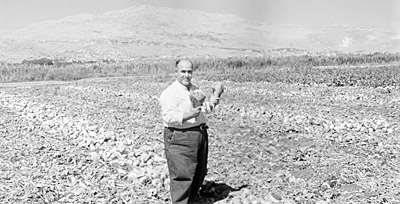


Deux experts en CTPD iraniens, MM. Jalaladdin Habibi et Majid Dehghan-Shoar, ont effectué une mission au Liban pour conseiller ce pays dans les domaines de la protection intégrée et de la production de betterave à sucre respectivement, à l'occasion d'une double mission, qui constitue un exemple réussi de transfert de technologie au niveau interrégional.
Le secteur agricole libanais est en récession depuis quelques années et les experts ont effectué leurs missions dans le pays dans le cadre d'un Projet de coopération technique coordonné par la FAO visant à améliorer la capacité de recherche et la productivité du secteur agricole, tout en assurant la sécurité alimentaire.
Les conditions agroclimatiques sont similaires en Iran et au Liban. Les experts iraniens ont passé plusieurs semaines dans ce dernier pays. Ils ont rencontré des agronomes travaillant pour des organismes de recherche publics en différents endroits, se sont rendus sur le terrain et ont dispensé une formation en cours d'emploi à des membres du personnel occupant des positions clefs.
En un fecundo ejercicio de transmisión interregional de tecnología, dos expertos iraníes en CTPD, el Dr. Jalaladdin Habibi y el Dr. Majid Dehghan-Shoar, realizaron dos consultas en el Líbano para asesorar al país sobre el manejo integrado de plagas (MIP) y la producción de remolacha azucarera, respectivamente.
El sector agrícola del Líbano ha sufrido en estos últimos años un retroceso, los expertos llevaron a cabo sus consultas en el país en el marco de un proyecto de cooperación técnica coordinado por la FAO para mejorar la investigación y productividad agrícolas de la nación, asegurando al propio tiempo la inocuidad de los alimentos.
Irán posee condiciones análogas a las del Líbano en materia de cultivo agrícola y los expertos iraníes pasaron varias semanas en el Líbano, donde se reunieron con investigadores agrónomos del país en varios lugares de su geografía, realizaron visitas sobre el terreno e impartieron capacitación a personal que ocupaba posiciones claves.
![]()
In a successful exercise in interregional technology transfer, Iranian TCDC experts Jalaladdin Habibi and Majid Dehghan-Shoar each undertook two consultancies in Lebanon to advise the country on integrated pest management (IPM)

Iranian TCDC expert Majid Dehghan-Shoar in a Lebanese sugar-beet field after harvesting |
Habibi spent a total of five weeks in Lebanon, where his task was to convey organic pest control methods to the staff of the National Agricultural Research Institute and affiliated research institutions. The crops included in his brief were citrus fruit, apples, olives and raisins, as well as greenhouse vegetables. One of Lebanon's chief agricultural problems is the overuse of pesticides. During his consultancy, the expert reviewed plant protection in the country, giving special attention to research on biological methods of pest control, taking into consideration the country's diverse altitudes and ecosystems. On the basis of visits to cultivated fields, orchards and market gardens, he identified the main areas on which research should focus and prepared a list of the major insect pests present in the target crops. He also listed the pest control equipment and materials required. He recommended several measures to increase the resistance of crops to pests and weeds, to combat the polluting effects of the indiscriminate use of poor-quality pesticides and to achieve an integrated system of pest management in Lebanon. The measures included: the large-scale production of auxiliary insects; the study of various bacteriological methods of pest control; the use of pheromone traps to catch insect pests; the study of the effect of insecticide residues; farmer education on improved cultivation techniques; and participation in international research projects on improved, disease-resistant cultivars and on plant protection.
The purpose of Dehghan-Shoar's two missions to Lebanon (lasting a total of 25 days) was specific: to improve the country's sugar-beet production. No systematic sugar-beet breeding programme exists in Lebanon and one of the expert's main recommendations was that such a programme should be started. Until now, the country's sugar-beet industry has depended on the use of imported cultivars whose resistance to disease and pests may not be as high that of locally developed species. Other constraints on the crop include the overuse of fertilizers, poor production and post-production practices and outmoded refining practices which cause sugar loss. The expert made a number of recommendations which are currently being acted upon by the Lebanese Government, including: more testing of the adaptability of foreign-imported, high-yielding, disease-resistant cultivars; improved crop husbandry; research on refining practices; and, above all, training of farmers and processing staff.